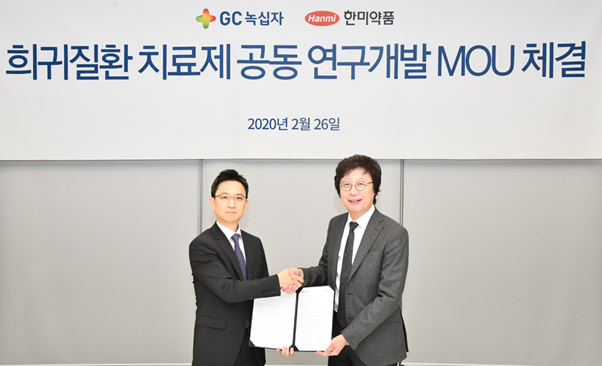Hanmi Pharmaceutical and GC said on Thursday that they will cooperate in developing the treatments of rare diseases.

The two companies expect that the cooperation between the two will become a meaningful case as it involves two of the top local pharmaceutical companies working together on the entire process of drug development from searching new candidate drugs to commercialization.
Under the accord, the two companies will jointly develop a treatment for lysosomal storage disease (LSD), a rare hereditary disease, using patents currently owned by Hanmi.
Currently, patients with LSD receive enzyme replacement therapy, which is an intravenous injection of an enzyme developed by genetic recombination technology. The two companies plan to build a new generation of new enzyme replacement innovations that dramatically improve the stability, half-life, ease of taking, and economic burden of existing first-generation therapeutics.
The two companies plan to maximize the synergy of their R&D capabilities through physical and human resource exchange and research cooperation.
“GC not only possesses differentiated capabilities in the field of rare disease treatments but also presents an innovative vision,” Hanmi CEO Kwon Se-chang said. “We hope that the combination of Hanmi’s accumulated R&D capabilities and GC’s differentiated capabilities will offer hope for patients suffering from rare diseases.”
GC President Huh Eun-chul also said, “We are very pleased to cooperate with Hanmi, who is reaching new limits for R&D in the Korean pharmaceutical industry.”
The joint research of the two companies, which have different strengths, will serve as a bridge to the development of next-generation therapies and a dramatic improvement in the therapeutic environment in the rare diseases, Huh added.

